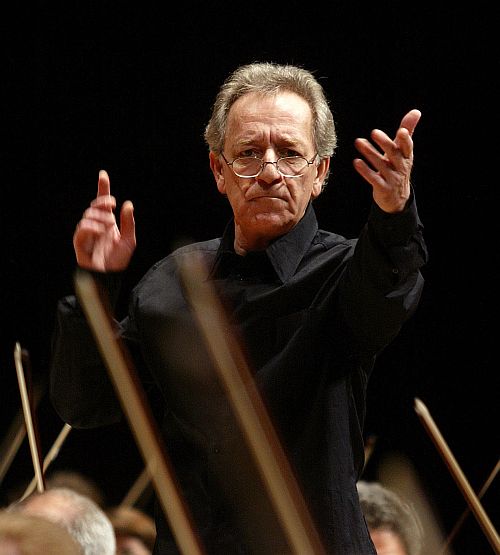 France Prokofiev, Tchaikovsky, Mussorgsky: Alisa Weilerstein (cello), Orchestre de Paris, Yuri Temirkanov (conductor), Salle Pleyel, Paris, 13.2.2013 (SRT)
France Prokofiev, Tchaikovsky, Mussorgsky: Alisa Weilerstein (cello), Orchestre de Paris, Yuri Temirkanov (conductor), Salle Pleyel, Paris, 13.2.2013 (SRT)
Prokofiev: Lieutenant Kijé Suite
Tchaikovsky: Variations on a Rococo Theme
Mussorgsky: Pictures at an Exhibition (orch. Ravel)

Yuri Temirkanov Photo Credit: IMG
For my last night in Paris I went along to the freshly renovated and acoustically very impressive Salle Pleyel to hear the Orchestre de Paris playing Russian music under a Russian conductor. What could be better, you might think? I’d only heard them live once before (at the 2001 Proms) so I went in with an open mind but, to my ears, at first they didn’t sound at all comfortable with Prokofiev’s Lieutenant Kijé. Guest conductor Yuri Temirkanov, who is Music Director of the St Petersburg Philharmonic, seemed to be encouraging them to play with a little more Russian recklessness, but they didn’t sound as though they were keen to follow him. The cornet solo, at the beginning and the end, sounded a little fractious, and the cello solo in the first movement was not exactly forthcoming. Things improved, and the overall impression of the suite was fine, but the attention to detail felt rather slack. Maybe, that’s because the orchestra has only played it once before (back in 1970 with Alain Lombard).
Not so with Alisa Weilerstein’s cello playing, however. Attention to detail characterised everything this astonishing young cellist did. Right from the opening phrases of the Rococo Variations it was clear that she had put a world of care and attention into every note, phrase and paragraph, making this a performance that was not just virtuosic and exciting but lyrically beautiful and thoroughly thought through. The orchestra followed her, too, making this work a much more convincing whole.
Everything sounded much more convincing in Pictures, too, but that’s not surprising when you consider that we know this Russian music primarily through the orchestration of a Frenchman, so a French orchestra and a Russian conductor is, in many ways, a very natural team to bring out the best in the suite. Mussorgsky’s (or should that be Ravel’s?) colours came up much more excitingly in this performance and the orchestral solos were first rate, the promenading trumpet and the saxophone in The Old Castle being only the two most prominent examples. Temirkanov had thought hard about his tempi and refused to follow simple orthodoxy. Gnomus was remarkably slow, but this added to the grotesquerie, while The Great Gate of Kiev flowed with much more movement than you often hear. The overall impression, however, was one of a successfully accomplished journey, and for music like this you can’t think of much higher praise. The blaze of the final pages showed that, for the performers as well as the composers, the Franco-Russian partnership seems to be working pretty well.
In an exciting move, by the way, the concert was filmed live and can be viewed on the orchestra’s website. How wonderful (and enlightened) to offer this service free of charge! Could some British orchestras learn from this?…
Simon Thompson